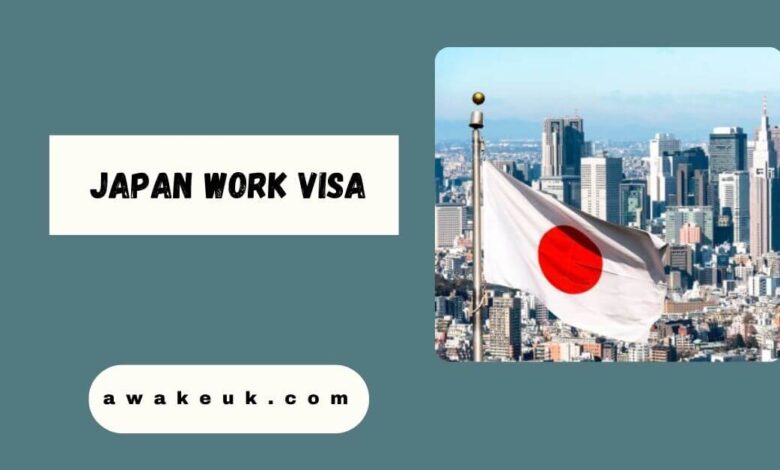Japan Work Visa 2025 – Types, Eligibility

Japan is a great place to start a new adventure because it has a lot of history and lots of possibilities. Getting a work visa could be the key to a fulfilling trip. Japan is constantly inviting people from all over the world to join its workforce because its population is getting older and it needs more foreign workers.
This guide will show you how to get a work visa for Japan in 2025 in an easy and accessible way, including jobs that will pay for your visa.
Introduction
The Japan Work Visa is an important paper that you need to start a career in Japan. This visa lets you do a lot of different things in the Land of the Rising Sun. Let’s get into the details of the Japan Work Visa and learn about the different kinds and requirements for getting one.
Understanding Japan Work Visa
Japan has different types of work visas for different jobs and businesses. Each type of visa is used for a different job, from experts to teachers. You need to be able to find your way through these choices in order to pick the one that fits your job goals.
Why Japan? The Need for Foreign Workers
Japan is known for its advanced technology and beautiful scenery, but its population is getting older, which is becoming a problem. To fix this, Japan wants to hire about 500,000 foreign workers by 2025. People who want to experience life in this one-of-a-kind country now have a great chance.
Benefits of Japan Work Visa
- Procurement of Employment Opportunities: Employment in Japan is legally possible for foreign nationals with a Japan work visa, granting them access to a wide variety of employment opportunities across industries.
- A Cultural Exploration: Engaging in labor in Japan offers a singular cultural encounter, enabling one to fully embrace the country’s customs, traditions, and way of life.
- Superior Quality of Life Standards: A desirable location to live and work, Japan is renowned for its efficient public services, high standard of living and safety.
- Profession Development: A career in Japan can improve an individual’s prospects for advancement by providing opportunities for networking, exposure to international work environments, and the acquisition of new skills.
- Technological Progress: Japan is a center for technological research and development, offering employment opportunities in cutting-edge industries such as robotics, electronics, and automotive, among others.
- Gaining Language Proficiency: Possessing the ability to acquire or enhance Japanese language skills through residence and employment in Japan can yield professional and personal benefits.
- Social and Healthcare Benefits: By possessing a valid visa, employees frequently benefit from Japan’s social security and healthcare systems, thereby promoting a secure and healthy way of life.
- Establishing a Global Network: Engaging in employment in Japan provides the opportunity to cultivate a global and domestic network of contacts and relationships, which can be extraordinarily beneficial to one’s future professional opportunities.
- Possibility of Sustained Residency: Servicing as a pathway to permanent residency or citizenship in Japan, a work visa provides the opportunity to establish one’s life and work in the country.
- Exchanges of Culture and Travel: Japan offers visitors the chance to investigate the nation’s abundant cultural legacy, visit a multitude of destinations, and become acquainted with distinct regions and customs.
Types of Japanese Work Visas
There are two main types of work visas in Japan, and each has its own groups:
1. Highly Skilled Professional Visa
- Highly Skilled Professional (i) (a)/(b)/(c): Designed for people who are doing advanced academic study or highly specialized technical work.Good for 5 years.
- Special Highly Skilled Professional: Needs a Bachelor’s or Master’s degree and work experience in the area.
- Highly Skilled Foreign Professional: For those with advanced skills and experience
Japan Working Visa
Many foreign workers can get this normal work visa, and they don’t need to have worked before. It can be given out for one, three, or five years.
Eligible Professions for Japanese Working Visa
Japan lets people with a variety of jobs get work visas, such as, but not limited to:
- Professors
- Artists
- English teacher
- Military personnel
- Engineer
- Service staff
- IT Professional
- Translator
- Banker
- School Teacher
- English Speaking
- Mechanics
- Electrical
- Religious activities
- Journalists
- Business managers
- Legal/accounting services
- Medical services
- Researchers
- Instructors
- Specialists in humanities/international services
- Intra-company transferees
- Nursing care
- Skilled labor
- Specified skilled workers
- Technical intern training
Application Process: Step by Step
- Obtain a Certificate of Eligibility (COE)
- Secure a job offer from a Japanese company.
- Submit necessary documents to your employer for COE application.
- Apply for Japan Work Visa at the Embassy
- Find the nearest Japanese embassy, consulate, or permanent mission.
- Get the things you need, like your passport, visa application form, picture, COE, job offer letter, and school records.
- Submission and Processing
- Submit your visa application and required documents.
- Expect a response within 5-6 working days.
- Visa fees range from about 3000 JPY for a single entry to 6000 JPY for multiple entries. The fees are due when the visa is approved.
Check Also: How To Get Malta Seasonal Work Visa
Visa Sponsorship Jobs in Japan
Japan has a lot of job openings that will sponsor your visa. These sites can help you start your job search:
Helpful Links
- Ministry of Foreign Affairs (MOFA): https://www.mofa.go.jp/j_info/visit/visa/long/index.html
- Japan Immigration Website: https://www.moj.go.jp/isa/
Conclusion
The 2025 work visa process for Japan makes it easy to visit this interesting country and use your skills to help the economy. There are jobs that will sponsor your visa in a lot of different fields, so you can start a new part of your work journey. Welcome the chance and start planning your trip to Japan right away!
Frequently Asked Questions:
-
What are the different types of Japan Work Visas available?
Japan has many types of cards, such as Specialist in Humanities, Engineer, Skilled Labor, and more. Each meets a different set of work needs.
-
How long does it take to process a Japan Work Visa?
The processing time varies, but on average, it takes several weeks. Applicants should plan accordingly.
-
Is it difficult to get a working visa in Japan?
It is difficult to obtain a work visa for jobs that do not require special skills. The second most common type of qualification after technical training is the engineer, humanist, or international service qualification.



